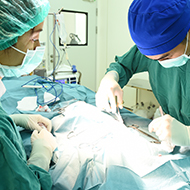Hippos become airborne when moving quickly, study finds
“We were pleasantly surprised to see how hippos get airborne when they move quickly – it’s really impressive!” – John Hutchinson.
Hippopotamuses can become airborne when moving quickly on land, a new study from the Royal Veterinary College has found.
It is the first time this phenomenon has been confirmed by scientists. Little was previously known about how they move on land, with previous studies offering limited and contradictory accounts of hippo locomotion.
The researchers studied video footage of two hippos moving in their paddock during the day at Flamingo Land Resort in Yorkshire, as well as videos of hippos from the internet. In total, the team examined 169 strides from 32 different hippos.
They found that while hippos almost exclusively trot or near-trot, they can became airborne when moving quickly, sometimes for as much as 15 per cent of the stride cycle.
The researchers hope their study could help veterinary assessments of lameness in hippos by providing a baseline for assessing whether a hippo is moving normally. The information could also help with the reconstruction of the evolutionary biomechanics of hippo lineages.
John Hutchinson, professor of evolutionary biomechanics and lead author of the study, said: “It’s hard to work with hippos as they tend to stick to the water, and very seldom are trained to be studied in zoo collections. They’re also very dangerous. That’s part of the reason why science knew little about how hippos move before our research.
“We’re thrilled to provide the first study purely focused on revealing how hippos walk and run. We were pleasantly surprised to see how hippos get airborne when they move quickly – it’s really impressive!”
Kieran Holliday, science and conservation officer at Flamingo Land Resort, added: “Understanding more about the species we work with will only help us to improve the care we can give them in the future, and the fact that this paper has uncovered possible new discoveries into hippo locomotion could have positive impacts to the wider zoo community in regards to husbandry and enclosure design.”
The study has been published in the journal PeerJ.
Image © Shutterstock



 Researchers at the University of Surrey are investigating reports of bleeding problems being seen in XL bully dogs following neutering operations.
Researchers at the University of Surrey are investigating reports of bleeding problems being seen in XL bully dogs following neutering operations.